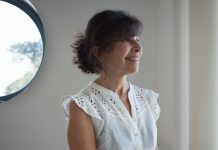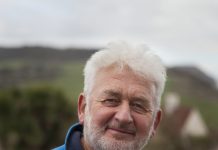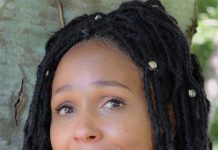Robin Mills went to Tatworth, Somerset, to meet voice actor Ellie Baer. This is her story.
“I was born in northern New Jersey, USA; Mom was from Brooklyn, Dad from Washington Heights. My mother was an identical twin: her last name was Rubenstein, but she and her sister, my Aunt Judy, performed as “The Turner Twins”; back in the day they were Vaudeville players, performing in New York, Alaska, Canada and for the USO providing entertainment for the troops. They did early radio and backed Buddy Greco on record as “The Twinairres”. They had beautiful singing voices, and were exquisite women. My Dad had been a test pilot in World War 2, and was very involved in the early development of radar. After the war, he worked in the record industry, was a cartoonist for the Saturday Evening Post, and then sold life insurance for most of my life. My mother gave up performing when she married in order to raise me and my two sisters. Although they weren’t an act any more, my mother still sang all the time; she would sing at school and charity functions, family get-togethers, and around the house, anywhere she could. We grew up on show tunes, the old standards, on the turntable and the radio, and my father, with his very musical ear loved it too; it was a very musical environment.
My father’s mother was one of seven sisters, all great characters. One of them, Aunt Sylvia, ran away to Panama aged 16, and got into silent movies. She referred to herself as a silent film star, but really she was an extra. We believe she married 7 different guys, all called Abe—and never divorced any of them. She had photos of herself with famous silent film stars of the day on the walls of her New York apartment, in the Henry Hudson hotel. My uncle, Art Baer, was a well-respected veteran comedy writer who wrote for TV shows like Dick Van Dyke, Happy Days, and Ed Sullivan. He was an adorable guy, lived life to the full, and I think he inspired my sister and me to go to California; but my Mom inspired me as a singer.
I was writing songs, singing and performing from 15 years old; it was an obvious choice for me to go to Ithaca College, in upstate New York, as a drama and music major. I graduated in ’78, and after that I was performing my original music in New York City, in popular nightclubs. This was the early eighties, and I was trying to get established as an artist with a recording deal, fashioning myself along the lines of some of the songwriters of the day like Joni Mitchell and Madonna. I had some interest from producer Phil Ramone’s well-known record label A&M, and we spent a couple of years developing my work, but it never really went anywhere, and I decided to move to LA.
My uncle was in LA, and my sister; and I married my first husband at that time. Everything was so free and easy there—that laid-back Californian scene was quite seductive to me, and in general there seemed to be plenty more options. I played piano bar for 10 years, all over; in hotels, on cruise ships, and I went to Japan for several months. Through this time I was developing my song writing, and managed to get a record deal with a small label called Cornerstone Records, and had some radio airplay. Unfortunately the label died before my tour began so, after shopping my songs again, I sold some children’s songs to Walt Disney. They then wanted me to do the singing voice of Daisy Duck. I was also on the Rock around the Mouse LP with Little Richard, the Lullaby Babies record with Stephen Bishop, and the movie The Little Mermaid. That sparked the idea of combining my music and acting into musical voiceover; I played characters that sing, fuzzy animals, and small boys, and became involved in production work with other kid-friendly animated brands. If I’m working in animation, I’ll usually have an image on which to base the voice, but sometimes I have to come up with an identifiable personality for absolutely anything—maybe even a ball of dust on the floor—using my voice only, which of course is only part of the resources any normal actor can use. With adverts, I’ll usually get a full character specification to base the voice on—she’s 30-40, she’s a Mom, she’s your best friend and she’s talking intimately to you, that kind of thing—and I record in my portable studio and send my MP3 files across the world to the client wherever they are.
I fell into television on the heels of divorce. My ex-husband and I remained amicable enough to raise our son Wilder together, but I needed to look at ways of increasing my income. Someone suggested I fill in as a production coordinator for a company involved with NBC network that was doing a mini-series on the American Revolution. Later when they found out I was a musician, I was asked to work on a Nashville TV network show called The Life and Times, about the legends of the Grand Ole Opry. I became a segment producer. The series profiled country music stars, like Kenny Rogers and Hank Williams Jr. In the end I worked in TV for 20 years, for many different production companies, and I produced many shows; one was called Biography, which was a flagship show for the Arts and Entertainment network in the States, profiling everyone from Lenin to Lennon. My favourite show was called Behind the Music—a series on famous rock artists shown on VH1 in the States; meeting artists who were inspirational to me was great, but the show perhaps focussed less on the art, and more on the drama—the sex, drugs and rock ’n roll. So sometimes I loved the work, and sometimes not. Occasionally the work was tedious, and I missed my art.
I was anxious to leave that world, because the day-in day-out of it was exhausting. I was also looking for a meaningful relationship, so I put my profile online—I didn’t join the website, I just wanted to see if anything at all happened. I then found I had 25 emails, all from the same guy in England. I was used to dating musicians and artists, the kind of guys who wore jeans, sneakers and bandanas. Here was this English businessman, called Terry, good looking but a bit conservative, and with a less-than seductive dating profile: “Divorced businessman seeks lively lady.” I hesitantly gave him my email address, but after we wrote and then skyped, we found we had a great, warm connection despite our different backgrounds. He was funny, intelligent, and of great integrity—as we say in Yiddish, a “mensch”. Eventually he came over to the States to meet me, we hit it off, and as they say the rest is history. After dating for 3 years we got married; the idea was to live in Los Angeles, because living apart from my son is torture to me. However, I can travel with my voiceover work, and his business is based here in the West Country, so that’s why we live in Somerset for now. We’re working on how we might move back to the States one day, much as I love it here in Somerset.
My son Wilder, who’s now 25 and living in Los Angeles, is a work in progress. He’s a comedian, he does stand-up; he plays a bunch of instruments, and writes music. He works at a television production company as a writer’s assistant, and is funny, talented and a delicious person. Most importantly, he’s my sushi soulmate. He and I spend hours and hours going to sushi bars together when I’m in LA. I’m probably an overbearing Jewish mother but I think he digs me. We torment each other with photos of sushi; his taken in LA, but I have to go to London to take mine.
The weather here is very different. I really like the rain, especially as we have so little in LA, but I like it as a mood, not all the time. Somerset, and England generally, is picturesque beyond words. I love the beauty in the greenness, the blossoming trees, the old buildings, the thatched cottages—it’s so lovely it makes me cry. And people here maybe take a little longer to get to know; my husband teases me about how “excited” we Americans are about everything. I do miss my close friends in the States, but I really love the solace here in Somerset; in LA, there’s so much going on all the time, much of it consumer-oriented (what to buy, what to wear, how’s my hair, what’s on TV, what movie did I miss, etc., etc.) But I do miss the sushi. That’s the hardest part.”









